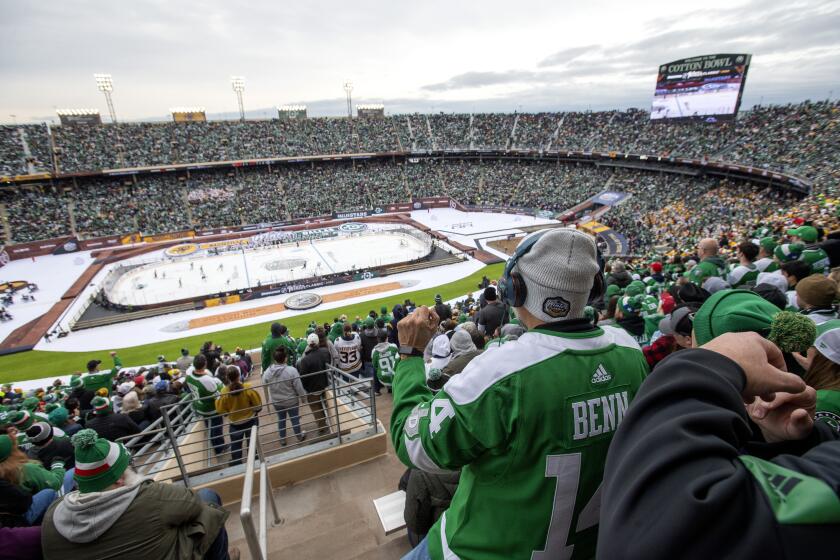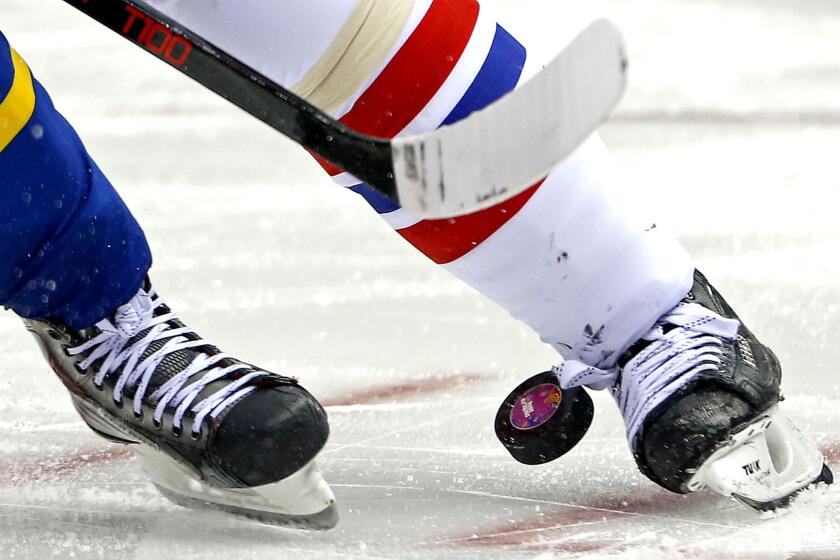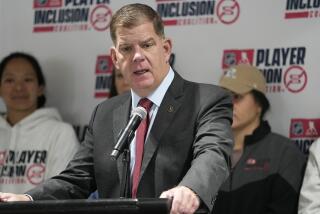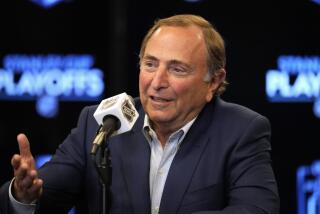Column: NHL may lose more games if league and players donât agree to restart plan soon
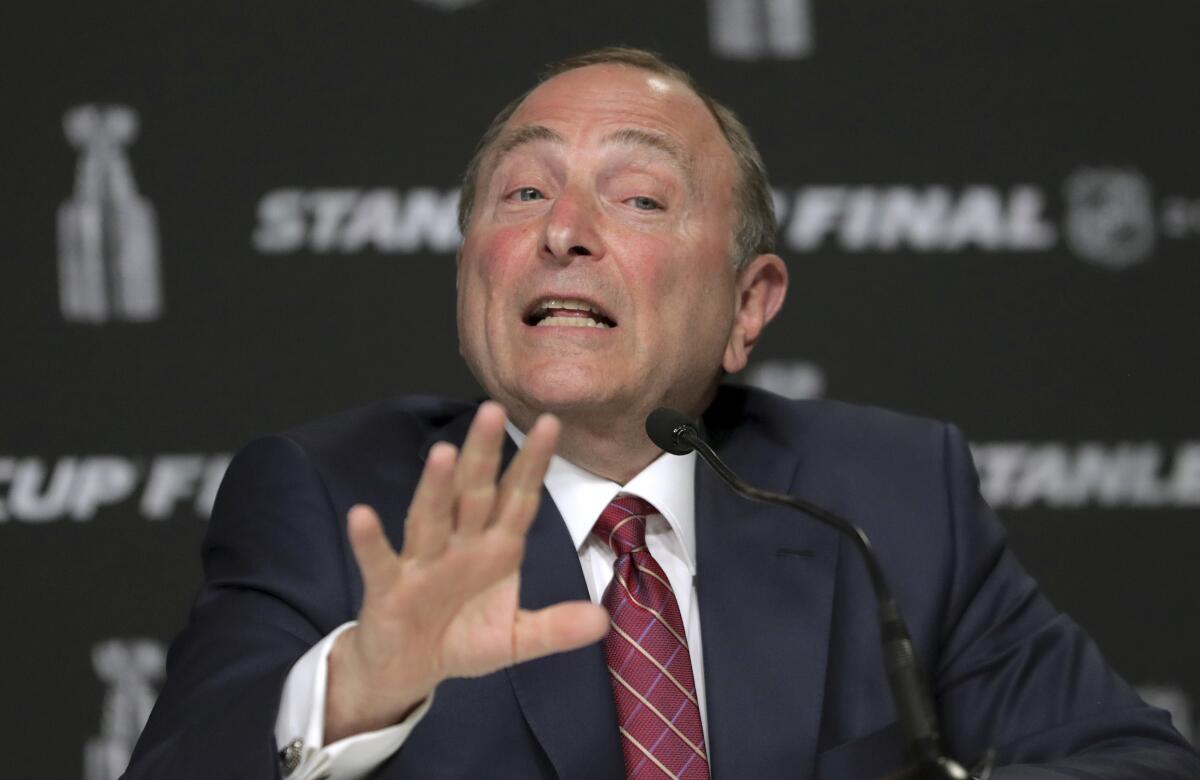
Time is growing short for the NHL to meet its target of launching the 2020-21 season on Jan. 1, and the list of obstacles is growing longer. Without an agreement between the league and the NHL Playersâ Assn. by next week, the opener could be pushed back another month, slashing the schedule below the hoped-for 60 to 62 games.
Negotiations hit some snags this week. According to people familiar with the discussions but not authorized to speak publicly, Commissioner Gary Bettman asked players to defer an additional 13% of their salaries next season beyond the 10% deferral they accepted in July. Players will eventually get that money back, but without interest. Bettman also proposed raising the escrow cap in each of the last three years of the labor agreement from 6% to 9%. Players previously agreed to cap escrow at 20% for 2020-21, at 14% to 18% in 2021-22, and at 10% in 2022-23.
Players held a conference call Wednesday and, predictably, were unhappy about Bettmanâs efforts to change terms of the four-month-old labor deal to accommodate clubsâ pandemic-deflated cash flow. But players want to play and owners want the league to regain a presence, so thereâs room for a compromise that could include Bettman sweetening the playersâ pot if revenues return to anything close to pre-pandemic levels.
The Kings and Ducks each released new alternate jerseys Monday as part of the NHLâs leaguewide âReverse Retroâ reveal.
Theyâll have to find common ground quickly to be up and running by New Yearâs Day, which is already a month later than Bettman had hoped. The seven teams that missed the expanded playoffs last season and have been off the ice since early March â a group that includes the Kings and Ducks â will be allowed to start training camp a week early and have a three-week camp. To open on Jan. 1, theyâd have to start around Dec. 11, followed a week later by the other 24 teams. Thereâs little time to waste because players who went overseas will have to comply with quarantine requirements in their teamâs home city before they can take to the ice.
âThe focus is still very much on Jan. 1, and the league and players are committed to making that happen,â said Kelly Cheeseman, chief operating officer of AEG, the Kingsâ parent company. âThat said, weâre going to have to make some decisions here in the next week or two, and weâre excited to make those decisions.â
Having games means having to make decisions. Thatâs good. But the NHLâs startup issues are more complex than those faced by the NBA, which crowned the Lakers as champions nearly two weeks after the Tampa Bay Lightning won the Stanley Cup but will return before the NHL, on Dec. 22.
Restrictions on nonessential crossings of the U.S.-Canada border are a major problem for the NHL. The NBA has one team in Canada, the Toronto Raptors, and can relocate them to the U.S. for a season. âObviously, weâre not going to move all seven Canadian franchises south of the 49th Parallel,â Bettman said during the recent Paley International Council Summit. The NHL is expected to temporarily realign and create an all-Canadian division with intradivision play. U.S.-based teams will play regionally focused schedules to minimize travel.
The NHL has postponed the 2021 editions of its Winter Classic and All-Star Weekend, citing âongoing uncertainty resulting from the coronavirus.â
Playing in tightly controlled bubbles like those created in Edmonton and Toronto during the playoffs is a nonstarter because players donât want to be away from loved ones for an entire season. A hub system is a possibility. âYouâll play for 10 to 12 days. Youâll play a bunch of games without traveling. Youâll go back, go home for a week, be with your family,â Bettman said. âWeâll have our testing protocols and all the other things you need. Itâs not going to be quite as effective as a bubble, but we think we can, if we go this route, minimize the risks to the extent practical and sensible.â Playing in home arenas remains ownersâ preference.
The NHLâs financial problems are intensified by its dependence on ticket revenues, one consequence of a U.S. TV deal that isnât as lucrative as those negotiated by the NFL, NBA and MLB. According to statista.com, gate revenue made up 36.6% of all NHL revenues in 2018-19; that doesnât include sales of concessions and merchandise at games. With wide distribution of a coronavirus vaccine likely a few months away, the entire season could be played without fans, a blow to clubsâ bottom lines.
A single infected hockey player managed to spread the coronavirus to at least 12 others during a match-up that highlights the challenges of containing COVID-19.
Another complication is that playing fewer than 70 games would obligate teams to give back some of their local TV rights fees. Thatâs an unpleasant prospect, but playing even a reduced number of games and keeping some broadcast and sponsor revenues would be better than getting no revenues at all.
As recently as late September, before Game 1 of the Stanley Cup Final, Bettman said he anticipated the 2020-21 season would feature a full, 82-game schedule. That was never realistic. Like the rest of us, he has had to become flexible. That should apply to both sides as they negotiate terms for the upcoming season.
More to Read
Go beyond the scoreboard
Get the latest on L.A.'s teams in the daily Sports Report newsletter.
You may occasionally receive promotional content from the Los Angeles Times.

